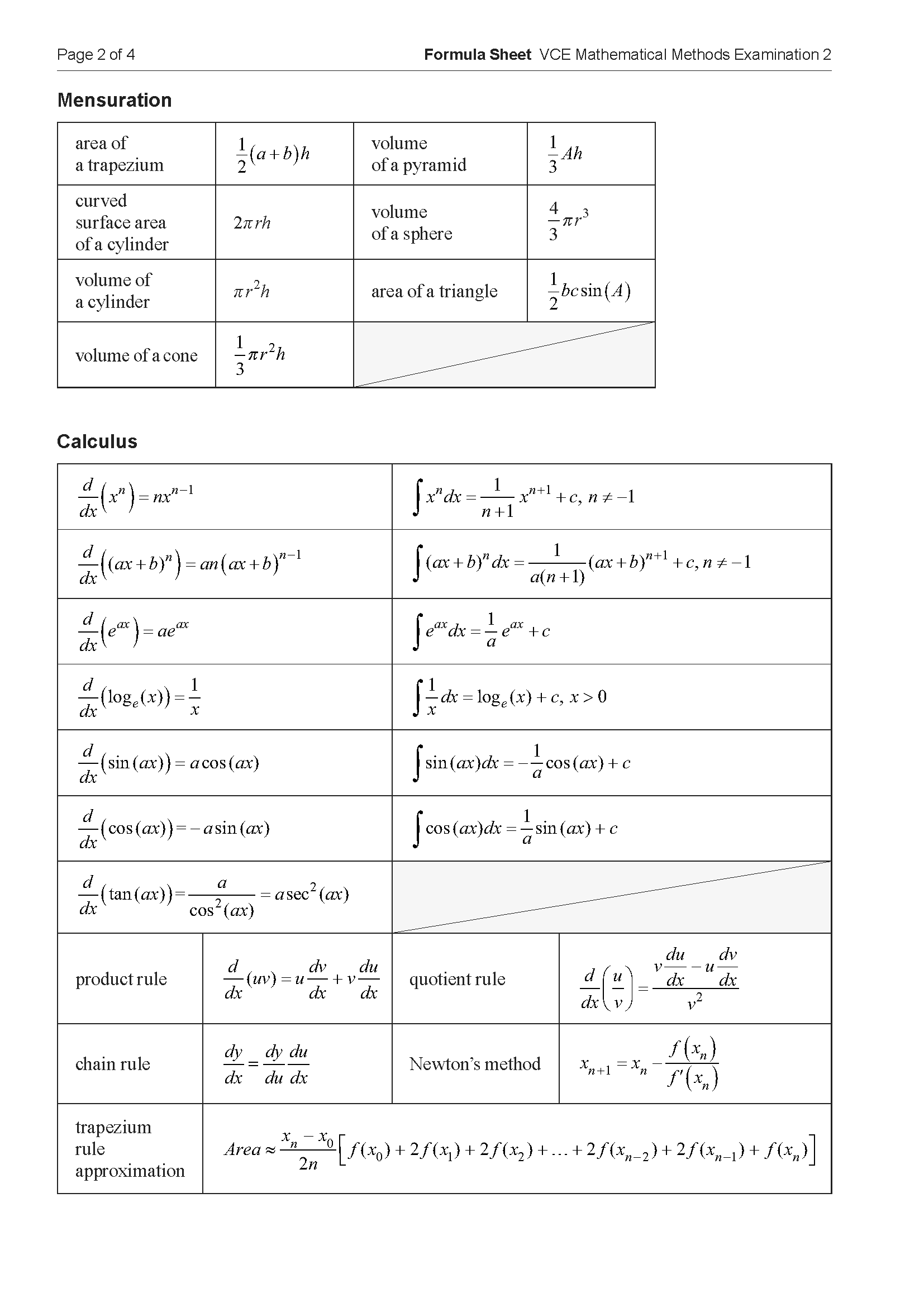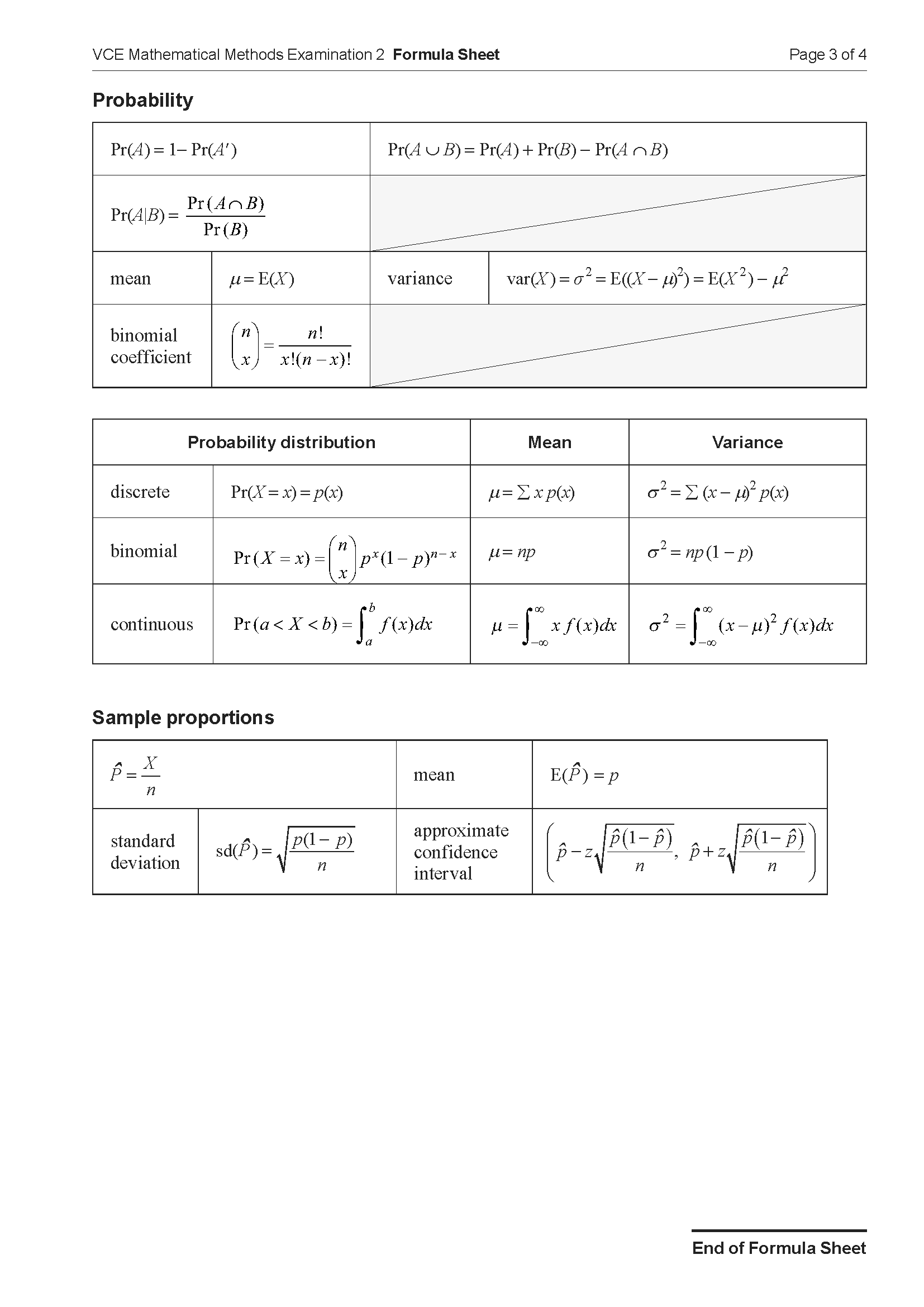2021 VCAA Maths Methods Exam 1
This is the full VCE Maths Methods Exam with worked solutions. You can also try Mini-Tests, which are official VCAA exams split into short tests you can do anytime.
Number of marks: 40
Reading time: 15 minutes
Writing time: 1 hours
Instructions
• Answer all questions in pencil on your Multiple-Choice Answer Sheet.
• Choose the response that is correct for the question.
• A correct answer scores 1; an incorrect answer scores 0.
• Marks will not be deducted for incorrect answers.
• No marks will be given if more than one answer is completed for any question.
• Unless otherwise indicated, the diagrams in this book are not drawn to scale.
a. Differentiate \( y = 2e^{-3x} \) with respect to \(x\). 1 mark
b. Evaluate \( f'(4) \), where \( f(x) = x\sqrt{2x+1} \). 2 marks
Let \( f'(x) = x^3 + x \).
Find \( f(x) \) given that \( f(1) = 2 \). 2 marks
Consider the function \( g : \mathbb{R} \rightarrow \mathbb{R}, g(x) = 2 \sin(2x) \).
a. State the range of \(g\). 1 mark
b. State the period of \(g\). 1 mark
c. Solve \( 2 \sin(2x) = \sqrt{3} \) for \( x \in \mathbb{R} \). 3 marks
a. Sketch the graph of \( y = 1 - \frac{2}{x-2} \) on the axes below. Label asymptotes with their equations and axis intercepts with their coordinates. 3 marks
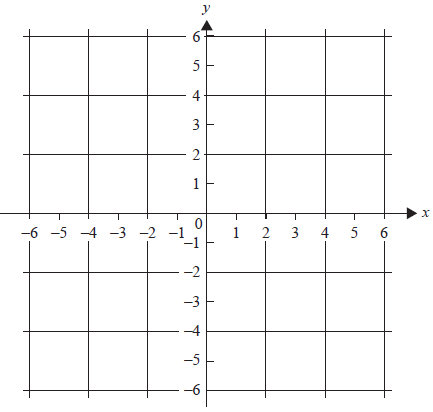
b. Find the values of \(x\) for which \( 1 - \frac{2}{x-2} \ge 3 \). 1 mark
Let \( f : \mathbb{R} \rightarrow \mathbb{R}, f(x) = x^2 - 4 \) and \( g : \mathbb{R} \rightarrow \mathbb{R}, g(x) = 4(x-1)^2 - 4 \).
a. The graphs of \(f\) and \(g\) have a common horizontal axis intercept at \((2, 0)\).
Find the coordinates of the other horizontal axis intercept of the graph of \(g\). 2 marks
b. Let the graph of \(h\) be a transformation of the graph of \(f\) where the transformations have been applied in the following order:
- • dilation by a factor of \( \frac{1}{2} \) from the vertical axis (parallel to the horizontal axis)
- • translation by two units to the right (in the direction of the positive horizontal axis)
An online shopping site sells boxes of doughnuts.
A box contains 20 doughnuts. There are only four types of doughnuts in the box. They are:
- • glazed, with custard
- • glazed, with no custard
- • not glazed, with custard
- • not glazed, with no custard.
- • \( \frac{1}{2} \) of the doughnuts are with custard
- • \( \frac{7}{10} \) of the doughnuts are not glazed
- • \( \frac{1}{10} \) of the doughnuts are glazed, with custard.
a. A doughnut is chosen at random from the box.
Find the probability that it is not glazed, with custard. 1 mark
b. The 20 doughnuts in the box are randomly allocated to two new boxes, Box A and Box B. Each new box contains 10 doughnuts.
One of the two new boxes is chosen at random and then a doughnut from that box is chosen at random.
Let \(g\) be the number of glazed doughnuts in Box A.
Find the probability, in terms of \(g\), that the doughnut comes from Box B given that it is glazed. 2 marks
c. The online shopping site has over one million visitors per day.
It is known that half of these visitors are less than 25 years old.
Let \( \hat{P} \) be the random variable representing the proportion of visitors who are less than 25 years old in a random sample of five visitors.
Find \( \Pr(\hat{P} \ge 0.8) \). Do not use a normal approximation. 3 marks
A random variable \(X\) has the probability density function \(f\) given by \( f(x) = \begin{cases} \frac{k}{x^2} & 1 \le x \le 2 \\ 0 & \text{elsewhere} \end{cases} \) where \(k\) is a positive real number.
a. Show that \(k = 2\). 1 mark
b. Find \(E(X)\). 2 marks
The gradient of a function is given by \( \frac{dy}{dx} = \sqrt{x+6} - \frac{x}{2} - \frac{3}{2} \).
The graph of the function has a single stationary point at \( \left(3, \frac{29}{4}\right) \).
a. Find the rule of the function. 3 marks
b. Determine the nature of the stationary point. 2 marks
Consider the unit circle \( x^2 + y^2 = 1 \) and the tangent to the circle at the point \(P\), shown in the diagram below.
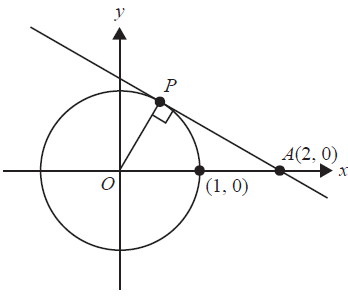
a. Show that the equation of the line that passes through the points \(A\) and \(P\) is given by \( y = -\frac{x}{\sqrt{3}} + \frac{2}{\sqrt{3}} \). 2 marks
Let \( T: \mathbb{R}^2 \rightarrow \mathbb{R}^2, T\left(\begin{bmatrix} x \\ y \end{bmatrix}\right) = \begin{bmatrix} 1 & 0 \\ 0 & q \end{bmatrix} \begin{bmatrix} x \\ y \end{bmatrix} \), where \( q \in \mathbb{R}\setminus\{0\} \), and let the graph of the function \(h\) be the transformation of the line that passes through the points \(A\) and \(P\) under \(T\).
b.
i. Find the values of \(q\) for which the graph of \(h\) intersects with the unit circle at least once. 1 mark
ii. Let the graph of \(h\) intersect the unit circle twice.
Find the values of \(q\) for which the coordinates of the points of intersection have only positive values. 1 mark
c. For \( 0 < q \le 1 \), let \(P'\) be the point of intersection of the graph of \(h\) with the unit circle, where \(P'\) is always the point of intersection that is closest to \(A\), as shown in the diagram below.
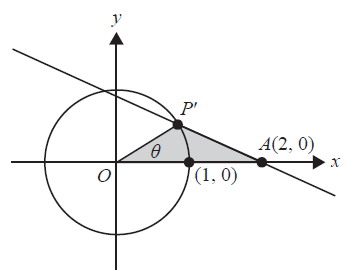
Let \(g\) be the function that gives the area of triangle \(OAP'\) in terms of \( \theta \).
i. Define the function \(g\). 2 marks
ii. Determine the maximum possible area of the triangle \(OAP'\). 2 marks
End of examination questions
VCE is a registered trademark of the VCAA. The VCAA does not endorse or make any warranties regarding this study resource. Past VCE exams and related content can be accessed directly at www.vcaa.vic.edu.au
